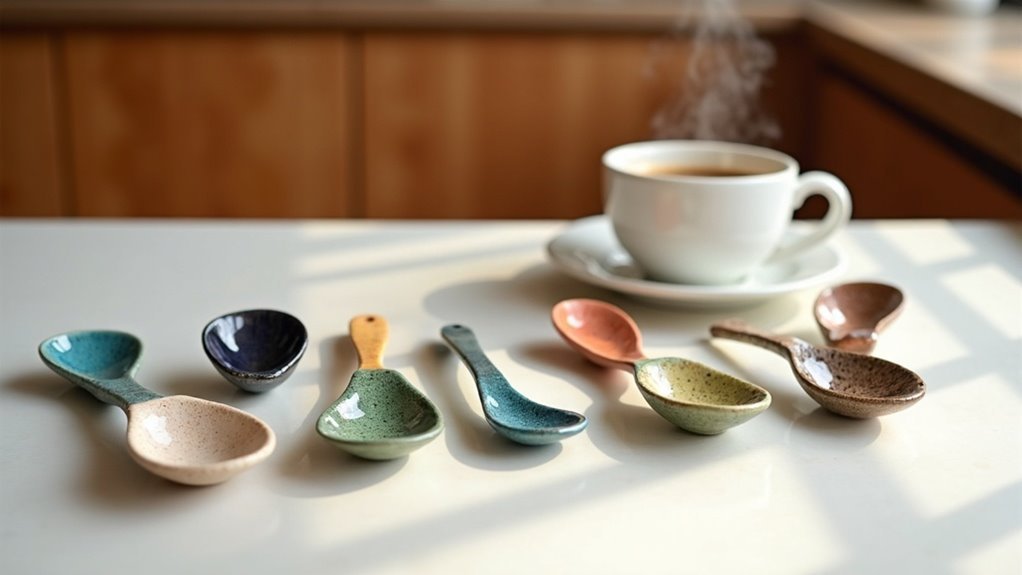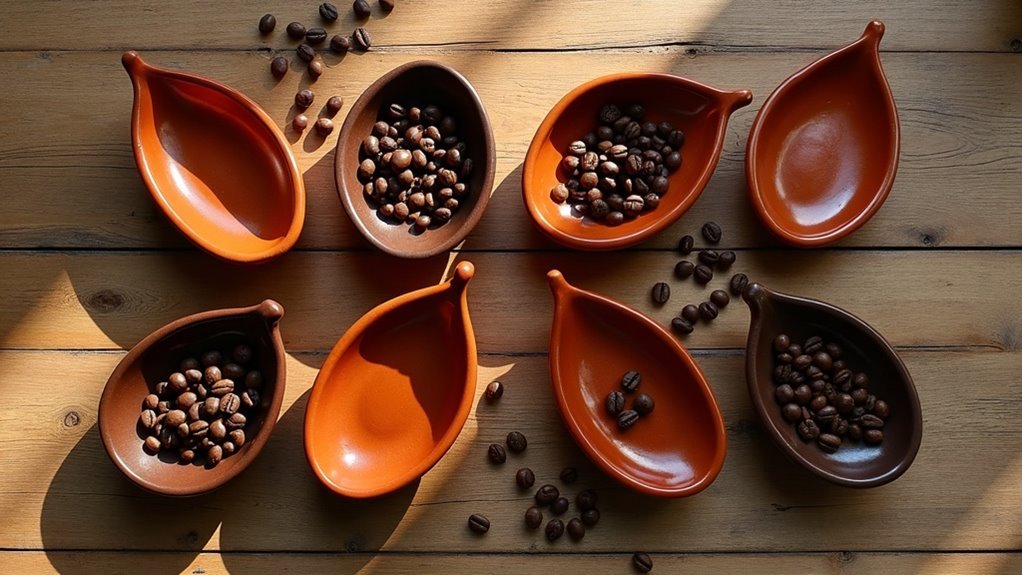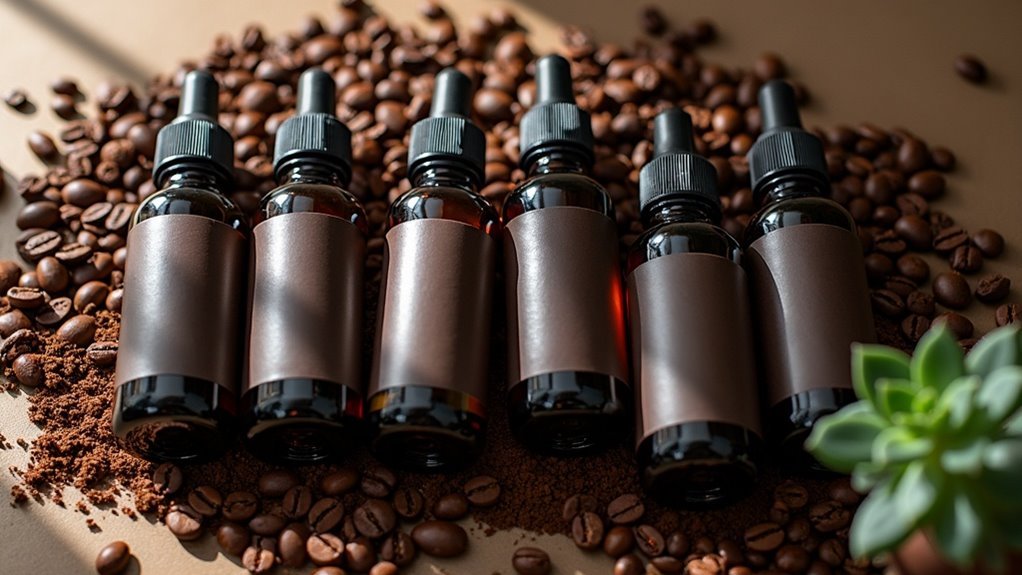Yes, coffee can help prevent gallstones. The caffeine in coffee stimulates gallbladder contractions and bile flow, which reduces cholesterol crystallization. Habitual coffee drinkers, especially those consuming six or more cups daily, may enjoy a 23% lower risk of symptomatic gallstone disease. It’s important to note that decaffeinated coffee doesn’t provide these benefits. Understanding how coffee impacts gallbladder health could enhance your appreciation for this beloved beverage and its integral role in your daily routine.
Key Takeaways
- Caffeine in coffee stimulates gallbladder contractions, promoting bile secretion and reducing the risk of cholesterol-rich gallstones.
- Regular consumption of caffeinated coffee can lower cholesterol levels in bile, aiding in gallstone prevention.
- Drinking six or more cups of caffeinated coffee daily may lead to a 23% reduced risk of symptomatic gallstone disease.
- Caffeinated coffee enhances gallbladder function by flushing out cholesterol and minimizing complications from existing stones.
- Decaffeinated coffee lacks the protective benefits against gallstones, making caffeinated options preferable for prevention.
How Coffee Affects Gallbladder Function
When you consume coffee, its caffeine content actively stimulates your gallbladder, promoting contractions that aid in bile secretion.
This enhanced gallbladder function can lower the risk of developing cholesterol-rich gallstones by reducing bile cholesterol concentrations.
Enhanced gallbladder function helps lower the risk of cholesterol-rich gallstones by reducing bile cholesterol concentrations.
Studies indicate that habitual coffee drinkers, consuming six or more cups daily, may enjoy a 23% reduced risk of symptomatic gallstone disease compared to non-drinkers.
However, it’s important to note that while coffee can prevent gallstones, it may worsen pain for those already experiencing gallbladder issues.
Decaffeinated coffee lacks the same protective effects, highlighting caffeine’s significant role in supporting gallbladder health.
If you’re a coffee lover, understanding how this beverage can benefit your gallbladder may enhance your appreciation for your daily cup.
The Role of Caffeine in Gallstone Prevention
Caffeine, particularly from coffee, may play a significant role in gallstone prevention by stimulating gallbladder contractions, which helps expel bile and reduces the risk of cholesterol crystallization.
Research shows that drinking six or more cups of coffee daily can lower your risk of developing symptomatic gallstones by 23%.
Additionally, habitual coffee consumption is linked to lower cholesterol levels in bile, enhancing its protective benefits against gallstones.
Therefore, enjoying coffee not only provides a delightful beverage experience but may also contribute to better gallbladder health.
Caffeine’s Gallbladder Contraction Effects
Although many factors contribute to gallstone formation, the role of caffeine in promoting gallbladder contraction highlights an important mechanism for prevention that coffee lovers can appreciate.
Caffeine stimulates gallbladder contraction, aiding in bile expulsion and potentially reducing the risk of gallstones. Studies indicate that individuals who enjoy six or more cups of coffee daily experience a 23% lower risk of symptomatic gallstones. This contraction may help flush out early-stage gallstones and decrease cholesterol concentrations in bile.
It’s noteworthy that caffeinated coffee offers a more substantial protective effect compared to decaffeinated options. However, those with existing gallstones should approach caffeine cautiously, as it may exacerbate discomfort.
Coffee’s Cholesterol Reduction Impact
Regular coffee consumption plays a significant role in reducing cholesterol concentrations in bile, which can help prevent gallstone formation. Research indicates that higher coffee intake is associated with a 23% lower risk of developing symptomatic gallstones. The caffeine in coffee stimulates gallbladder contractions, promoting bile flow and aiding in cholesterol clearance, thereby helping to flush out early-stage gallstones. The following table summarizes key findings:
| Coffee Type | Gallstone Risk Reduction |
|---|---|
| Caffeinated Coffee | 23% |
| Decaffeinated Coffee | No significant effect |
Enjoying a cup of coffee not only provides a delightful experience but may also contribute to better gallbladder health!
Protective Benefits Against Gallstones
Emerging evidence highlights the protective benefits of coffee, particularly caffeinated varieties, against gallstones, reinforcing its role in promoting gallbladder health.
Drinking caffeinated coffee regularly may considerably reduce the risk of developing symptomatic gallstones by stimulating gallbladder contraction, which aids in flushing out cholesterol from bile.
Studies suggest that consuming six or more cups daily can lower this risk by about 23%. Unlike decaffeinated coffee, caffeinated varieties are consistently linked to a lower incidence of gallbladder disease.
By enhancing gallbladder function, caffeine not only prevents the formation of gallstones but also minimizes complications associated with existing stones, promoting overall gallbladder well-being.
Enjoying your daily cup of coffee can contribute positively to your gallbladder health.
Dietary Considerations for Gallbladder Health
Maintaining gallbladder health is essential, and coffee consumption can play a significant role in this regard. Studies suggest that drinking coffee regularly, specifically 6 or more cups daily, may lower the risk of gallstone formation by 23%.
In addition to coffee, consider focusing on healthy fats from sources like olive oil and fish oil while avoiding trans fats found in fried foods.
It’s also important to ensure a high-fiber intake with plenty of fruits and vegetables, while limiting refined carbohydrates and sugars to support overall gallbladder function.
Signs and Symptoms of Gallbladder Issues
If you experience a dull ache or sharp pain in your abdomen, especially after consuming coffee, it could signal potential issues with your digestive system.
You might also feel an unusual fullness or tenderness on the right side of your abdomen. These symptoms, along with nausea or vomiting, warrant attention and could indicate varying stages of digestive discomfort, possibly related to your coffee intake.
Common Symptoms Experienced
Coffee consumption can often lead to a range of symptoms that may affect your daily routine. Recognizing these symptoms is essential, as they can indicate your body’s reaction to caffeine or other components in coffee.
Common symptoms associated with coffee consumption include:
- Stomach discomfort, which can range from mild unease to more pronounced pain
- A feeling of fullness or bloating in your stomach
- Nausea or jitteriness, possibly accompanied by restlessness or insomnia
If you experience multiple symptoms after drinking coffee, it may be beneficial to assess your intake and discuss any concerns with a healthcare professional to explore ways to enjoy coffee without adverse effects.
Pain After Eating
Experiencing discomfort after drinking coffee can indicate underlying digestive issues, especially if it occurs after consuming strong or acidic brews. This discomfort can range from a dull ache to sharp cramps in the stomach area, often intensifying shortly after consumption. Accompanying symptoms may include bloating, nausea, heartburn, and restlessness, particularly if caffeine sensitivity is present. Understanding these signs is crucial, as they may suggest gastrointestinal distress or intolerance to coffee. Consulting a healthcare professional is recommended for accurate diagnosis and management.
| Symptom | Description | Action Needed |
|---|---|---|
| Discomfort After Coffee | Dull or sharp stomach pain | Consult a healthcare provider |
| Bloating | Abdominal distension | Monitor coffee intake |
| Nausea | Feeling of sickness | Stay hydrated |
| Heartburn | Burning sensation in the chest | Consider reducing caffeine intake |
Recommended Treatments for Gallbladder Problems
When managing coffee-related issues, various treatment options are available that cater to the specific type and severity of the condition. You might consider:
- A balanced coffee consumption to reduce acidity and promote overall digestive health.
- Adjusting brewing methods, such as using a cold brew process, to minimize bitterness and enhance flavor.
- Consulting with a barista or coffee expert for personalized recommendations based on your taste preferences and tolerance levels.
If sensitivity or adverse reactions occur, it may be necessary to explore alternative beverages or decaffeinated options.
Adopting these strategies can help improve your coffee experience while ensuring you enjoy it in a way that suits your needs.
Regular consultation with coffee enthusiasts or experts is essential for effective enjoyment and management.
The Importance of Consultation and Professional Guidance
Seeking professional guidance is vital for anyone navigating coffee-related issues, as accurate information and tailored recommendations can greatly enhance your coffee experience.
If you’re experiencing concerns related to coffee consumption, a consultation with a coffee expert or barista is imperative. They can identify your specific preferences and sensitivities, especially if you have a history of caffeine-related issues.
Consulting a coffee expert or barista is essential for addressing your unique preferences and caffeine sensitivities.
Coffee preparation varies based on the type of beans and brewing methods, emphasizing the need for personalized approaches. Additionally, professionals can recommend specific blends or brewing techniques that may enhance your enjoyment and minimize any adverse effects.
Engaging with coffee specialists guarantees access to the latest trends and knowledge, promoting a richer coffee experience for enthusiasts.








